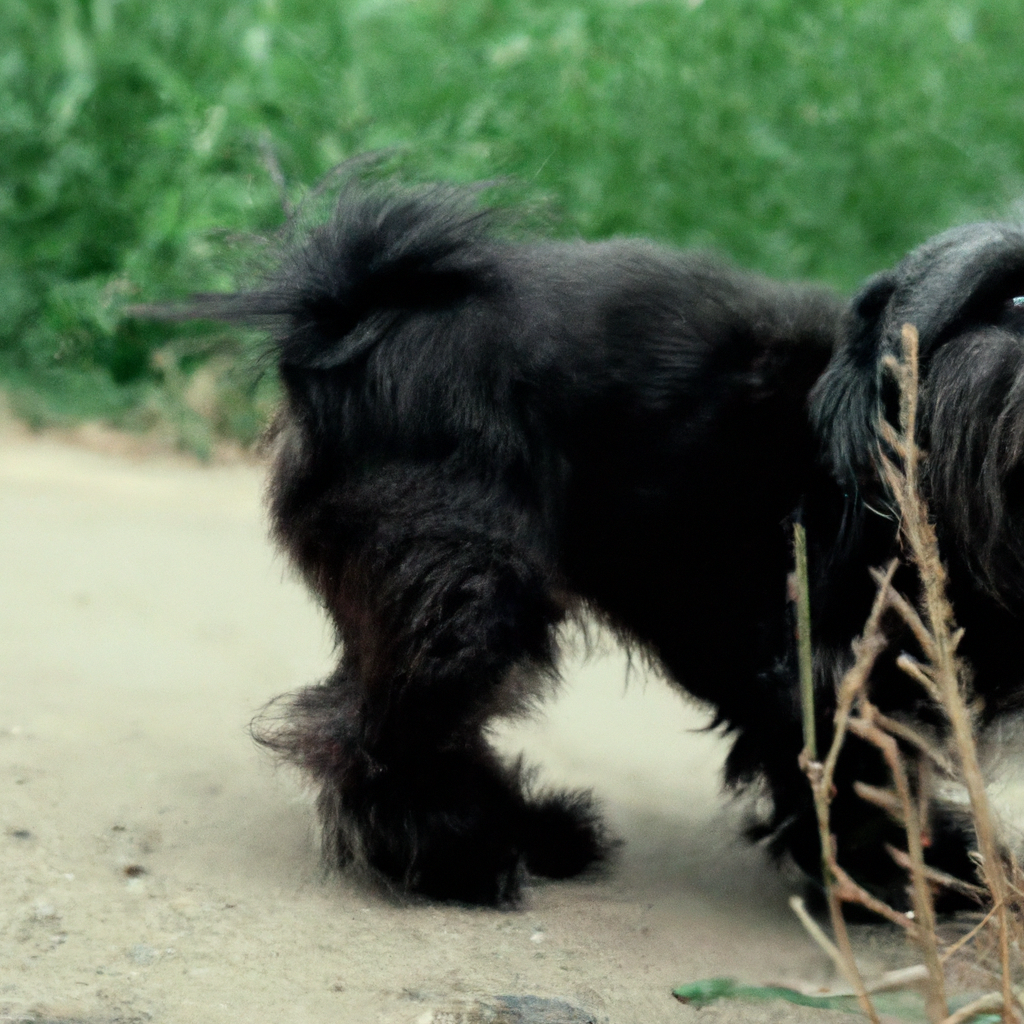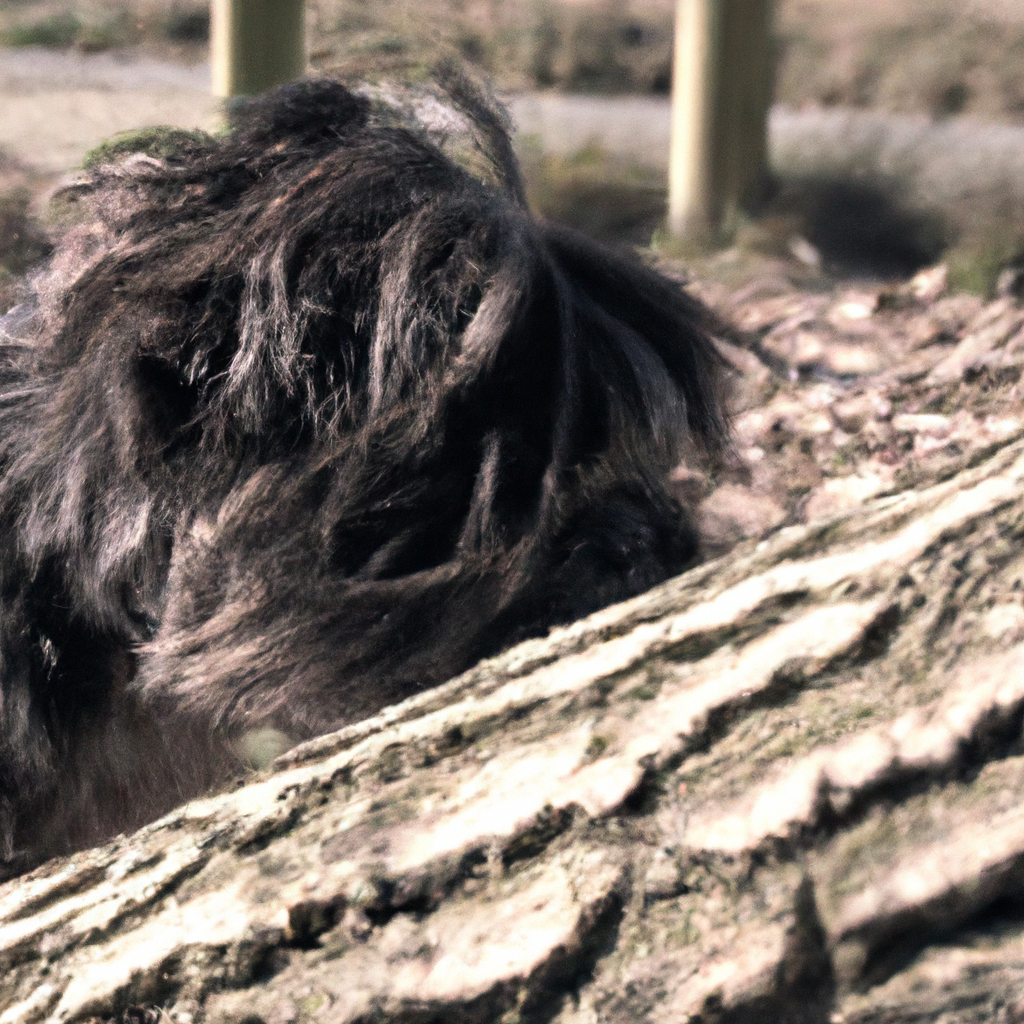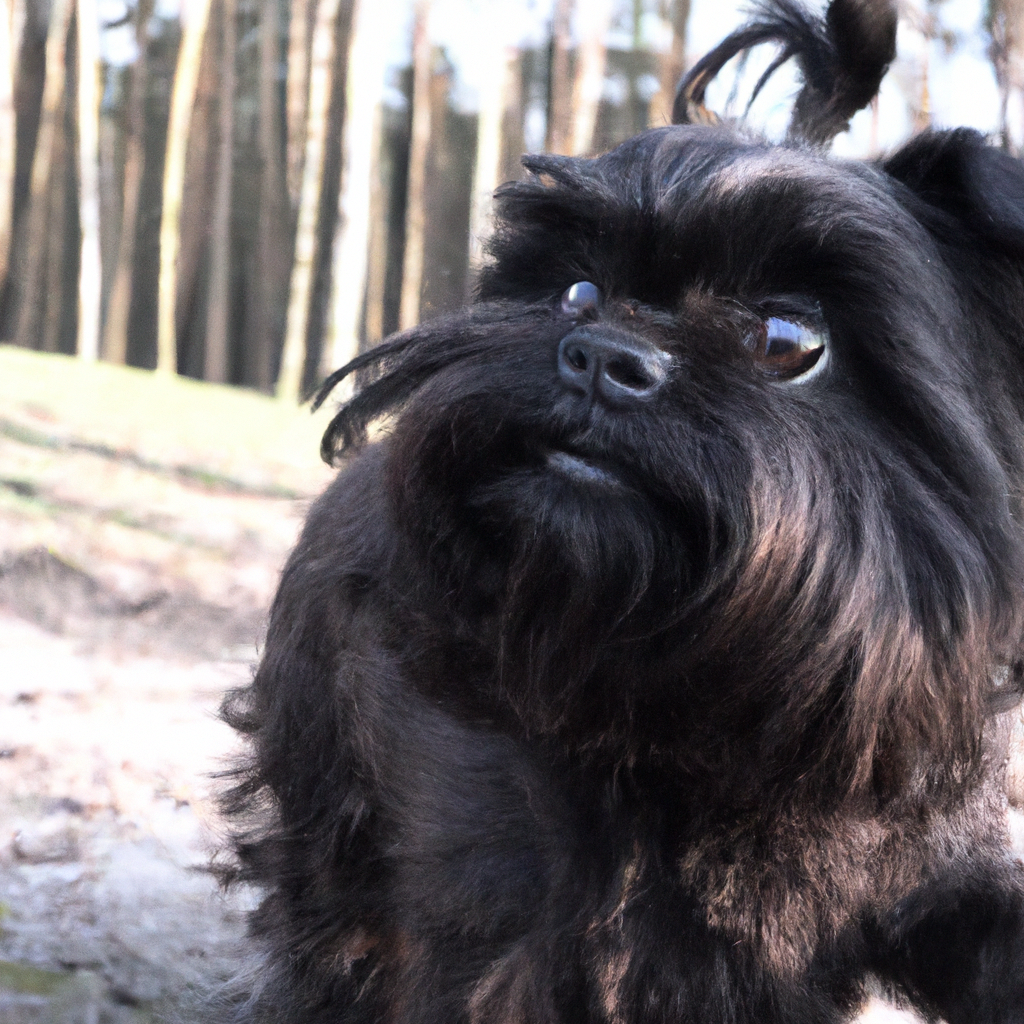Affenpinschers, also known as “Monkey Terriers,” are known for their frequent barking. This behavior is primarily due to their historical role as ratters and watchdogs, where barking was a means of alerting their owners to the presence of intruders or pests. Today, their barking can be triggered by a variety of factors, including boredom, anxiety, excitement, or the need for attention. Understanding the reasons behind an Affenpinscher’s barking is crucial for effective training and ensuring a harmonious living environment.
Understanding the Affenpinscher’s Barking Tendencies
Affenpinschers, often referred to as “Monkey Terriers” due to their distinct primate-like appearance, are small but incredibly spirited dogs. They are known for their playful and adventurous nature, but one characteristic that stands out is their tendency to bark a lot. If you’re considering bringing an Affenpinscher into your home, it’s essential to understand why they bark so much and how this behavior can be managed.
Affenpinschers are a breed that is naturally alert and protective. They were initially bred to keep homes and stables free from rodents, which required them to be vigilant and responsive. This instinctive alertness is one of the primary reasons why Affenpinschers tend to bark more than other breeds. They are quick to sound the alarm at any perceived threat, be it a stranger at the door or a squirrel in the yard. Their barking is a way of communicating that something is happening that requires your attention.
Another reason for their frequent barking is their high energy levels. Affenpinschers are lively and active dogs that require regular mental and physical stimulation. If they become bored or under-stimulated, they may resort to barking as a way to release pent-up energy or to get your attention.
Moreover, Affenpinschers are known for their strong personalities. They are confident, bold, and can be quite stubborn. This means that if they want something, they won’t hesitate to make their desires known, often through persistent barking. Whether they’re demanding a treat, a walk, or simply some attention, their vocalizations are a clear indication of their needs and wants.
Understanding why Affenpinschers bark so much is the first step in managing this behavior. Once you know what triggers their barking, you can take steps to reduce these triggers. For instance, if your Affenpinscher barks at every passerby, consider closing the blinds or moving your dog to a part of the house where they can’t see out the window. If boredom is the issue, ensure they have plenty of toys and regular exercise to keep them occupied.
Training is also a crucial part of managing an Affenpinscher’s barking tendencies. Teaching them commands such as “quiet” or “enough” can be very effective. However, it’s important to remember that Affenpinschers are a stubborn breed, so patience and consistency are key. Reward-based training methods, where the dog is rewarded for quiet behavior, can be particularly successful.
While Affenpinschers may bark a lot, it’s important to remember that this is a natural part of their behavior and not necessarily a sign of a problem. It’s a way for them to communicate with you and the world around them. However, if the barking becomes excessive or disruptive, it may be worth consulting with a professional dog trainer or a veterinarian to rule out any underlying health issues.
In conclusion, Affenpinschers are a lively and spirited breed with a natural tendency to bark. Their barking is a product of their alertness, energy levels, and strong personalities. By understanding these factors and implementing appropriate training and management strategies, you can ensure that your Affenpinscher’s barking remains under control, making them a delightful and entertaining addition to your family.
The Role of Communication in Affenpinscher’s Frequent Barking
Affenpinschers, often referred to as “Monkey Terriers” due to their distinct primate-like appearance, are small but incredibly energetic dogs. They are known for their playful and adventurous nature, but one characteristic that stands out is their frequent barking. If you’ve ever wondered why Affenpinschers bark a lot, the answer lies in understanding their behavior and the role of communication in their lives.
Affenpinschers are naturally alert and protective, which is a trait inherited from their ancestors who were bred to hunt rats and other pests. This instinctive alertness often translates into frequent barking, especially when they sense unfamiliar people or animals in their territory. They use their bark as a warning signal to alert their owners of potential threats. So, if your Affenpinscher is barking a lot, it might be trying to tell you that something is not right in its environment.
However, not all barking is a sign of danger. Affenpinschers, like other dogs, use barking as a form of communication. They bark to express a range of emotions and needs. For instance, they might bark when they are excited, anxious, bored, or seeking attention. Understanding the different types of barks can help you respond appropriately to your Affenpinscher’s needs and potentially reduce unnecessary barking.
Excitement is a common trigger for barking in Affenpinschers. These dogs are full of energy and love to play. When they are excited, they often express it through barking. This could be when you come home after being away, during playtime, or when they meet new people or dogs. In such cases, the barking is usually high-pitched and accompanied by other signs of excitement like wagging tails and jumping.
On the other hand, if your Affenpinscher is barking in a low, continuous tone, it might be expressing anxiety or fear. This could be triggered by various factors such as loud noises, unfamiliar environments, or separation from their owners. It’s important to identify and address the source of their anxiety to help them feel safe and secure.
Boredom can also lead to excessive barking in Affenpinschers. These dogs are intelligent and require mental stimulation. If they are left alone for long periods or don’t get enough exercise, they might resort to barking to express their frustration or to entertain themselves. Providing them with toys, regular exercise, and interactive activities can help keep them engaged and reduce boredom-induced barking.
Lastly, Affenpinschers might bark to get your attention. If they want something, like food or a walk, they might bark to let you know. They might also bark for attention if they feel ignored. In such cases, it’s important not to reinforce this behavior by giving them what they want immediately. Instead, train them to communicate their needs in a less disruptive way.
In conclusion, frequent barking in Affenpinschers is often a form of communication. By understanding their behavior and the reasons behind their barking, you can better respond to their needs and manage their barking effectively. Remember, every Affenpinscher is unique, and what works for one might not work for another. It’s all about understanding your individual dog and working with them to create a happy and harmonious living environment.
Exploring the Affenpinscher’s Behavior: Why They Bark So Much
Affenpinschers, affectionately known as “Monkey Dogs” due to their primate-like appearance and playful nature, are small but mighty creatures. They are known for their distinctive, wiry coats, expressive eyes, and most notably, their tendency to bark a lot. If you’ve ever wondered why Affenpinschers bark so much, you’re not alone. This behavior can be puzzling, especially for those who are new to this breed. However, understanding the reasons behind their barking can help you appreciate these little dogs even more.
Firstly, it’s important to remember that barking is a natural form of communication for dogs. Just like humans use words to express their feelings and needs, dogs use barks. Affenpinschers, in particular, are known for their vocal nature. They are alert and curious dogs, always on the lookout for anything unusual. When they spot something out of the ordinary, they won’t hesitate to sound the alarm with a series of barks. This makes them excellent watchdogs, despite their small size.
Secondly, Affenpinschers are known for their high energy levels. They are lively and playful, always ready for a game or a walk. If they don’t get enough physical and mental stimulation, they may resort to barking out of boredom or frustration. Regular exercise and playtime can help keep their barking in check.
Another reason why Affenpinschers bark a lot is their strong protective instinct. They are fiercely loyal to their families and will do anything to protect them. If they perceive a threat, whether real or imagined, they will bark to warn their family and scare away the intruder. This protective nature is part of what makes Affenpinschers such endearing pets. They may be small, but they have big hearts and aren’t afraid to stand up for their loved ones.
Lastly, Affenpinschers may bark a lot due to their independent and somewhat stubborn nature. They are intelligent dogs with a mind of their own. If they want something, they won’t hesitate to let you know, often through persistent barking. This can be a challenge for first-time dog owners, but with patience and consistent training, it can be managed.
In conclusion, Affenpinschers bark a lot due to a combination of their alert nature, high energy levels, protective instinct, and independent personality. While their barking can be loud and frequent, it’s also a testament to their spirited and loving nature. Understanding why they bark so much can help you better meet their needs and form a stronger bond with them.
Remember, every Affenpinscher is unique and may not exhibit all these traits. Some may bark more than others, while some may be relatively quiet. It’s all part of the charm of this delightful breed. So, the next time your Affenpinscher barks, instead of getting frustrated, take a moment to appreciate their lively spirit and unwavering loyalty. After all, their barking is just one of the many ways they express their love for you.
Decoding the Affenpinscher’s Bark: What Are They Trying to Say?

Affenpinschers, affectionately known as “Monkey Dogs” due to their primate-like appearance and playful nature, are a small breed of dog that originated in Germany. They are known for their distinctive, wiry coats and their expressive faces. However, one characteristic that often stands out to Affenpinscher owners and those considering adopting one is their propensity to bark. So, why do Affenpinschers bark a lot? Understanding their behavior can provide valuable insights into this unique breed.
Firstly, it’s important to remember that barking is a natural form of communication for dogs. Just as humans use words to express their feelings and needs, dogs use barks. Each bark can convey a different message, from alerting their owners to potential danger to expressing excitement or anxiety. Affenpinschers are no different. Their barks can be a way of communicating their needs or feelings to their owners.
However, Affenpinschers are known to bark more than some other breeds. This is partly due to their history as ratters. These dogs were originally bred to hunt and kill rats and other pests in homes and stables. This required a high level of alertness and a strong instinct to warn their human companions of potential threats. As a result, Affenpinschers have a heightened sense of awareness and are quick to sound the alarm at any perceived danger. This can result in frequent barking, especially when they are in unfamiliar environments or situations.
Another reason why Affenpinschers may bark a lot is their high energy levels. These dogs are known for their playful and spirited nature. They love to be the center of attention and will often bark to express their excitement or to invite their owners to play. If an Affenpinscher is bored or not getting enough exercise, they may also bark to express their frustration.
Understanding the reasons behind an Affenpinscher’s barking is the first step in managing it. If your Affenpinscher is barking due to boredom or a lack of exercise, increasing their physical activity and providing them with stimulating toys can help. If they are barking at perceived threats, training them to understand that not all unfamiliar sights or sounds are dangerous can help reduce their anxiety and the frequency of their barking.
It’s also important to remember that while Affenpinschers may bark a lot, they are also known for their loyalty and affectionate nature. They form strong bonds with their owners and are known to be excellent companions. Their barking is simply a part of their communication and personality.
In conclusion, Affenpinschers bark a lot due to their history as ratters, their high energy levels, and their instinct to communicate with their owners. Understanding these reasons can help owners manage their Affenpinscher’s barking and appreciate it as a part of their unique personality. After all, every bark is a part of the conversation with your Affenpinscher, and understanding their language only deepens the bond between you.
The Affenpinscher’s Bark: A Sign of Distress or Just Their Nature?
Affenpinschers, often referred to as “Monkey Terriers” due to their distinct primate-like appearance, are small but mighty dogs known for their playful and adventurous nature. However, one characteristic that often stands out is their propensity to bark. If you’ve ever wondered, “Why do Affenpinschers bark a lot?” you’re not alone. This behavior can be puzzling, especially for new Affenpinscher owners. Is it a sign of distress, or is it just their nature? Let’s delve into this topic to better understand these adorable little creatures.
Affenpinschers are known for their bold and protective nature. Despite their small size, they are fearless and won’t hesitate to stand their ground. This bravery often manifests itself in their barking. They bark to alert their owners of potential threats, be it a stranger at the door or a squirrel in the yard. This protective instinct is deeply ingrained in their nature, making them excellent watchdogs. So, if your Affenpinscher barks a lot, it might just be them doing their job, protecting their territory and their loved ones.
However, Affenpinschers are also known for their high energy levels and need for constant stimulation. Boredom can lead to excessive barking in these dogs. If they’re not given enough physical and mental exercise, they may resort to barking as a way to release pent-up energy or to get your attention. Regular walks, playtime, and mental stimulation through puzzle toys can help curb this behavior.
On the other hand, Affenpinschers are also very social animals. They thrive on companionship and don’t like being left alone for long periods. Separation anxiety can be a significant issue for these dogs, and excessive barking can be a sign of distress in these situations. If your Affenpinscher barks excessively when you’re not home, it might be a cry for help. In such cases, it’s essential to address the root cause of the anxiety rather than just the symptom (barking). Professional help from a dog behaviorist or trainer can be beneficial in these situations.
It’s also worth noting that Affenpinschers, like all dogs, use barking as a form of communication. They bark to express a range of emotions – excitement, fear, frustration, or even just to say hello. Understanding the different types of barks can help you better understand your Affenpinscher’s needs and emotions. A high-pitched, continuous bark might indicate excitement or playfulness, while a low, growling bark might signal fear or aggression.
In conclusion, while Affenpinschers do tend to bark a lot, it’s not always a cause for concern. It’s often just their way of communicating or expressing their protective nature. However, excessive barking can also be a sign of underlying issues like boredom, anxiety, or distress. As responsible pet owners, it’s our job to understand and address these issues. Remember, every dog is unique, and what works for one might not work for another. Patience, understanding, and a little bit of professional help can go a long way in ensuring your Affenpinscher is happy, healthy, and well-behaved.
Why Affenpinschers Bark More Than Other Breeds
Affenpinschers, affectionately known as “Monkey Dogs” due to their primate-like appearance and playful nature, are a small breed of dog that originated in Germany. They are known for their distinctive wiry coat, expressive eyes, and most notably, their tendency to bark more than other breeds. If you’re considering bringing an Affenpinscher into your home, it’s essential to understand why they bark so much and how this behavior fits into their unique personality and breed characteristics.
Affenpinschers are naturally alert and protective, which is a trait that has been ingrained in them from their early days as ratters in German stables. Their job was to keep the stables free from rats and other pests, a task that required them to be vigilant and responsive. This instinctive alertness is one of the primary reasons why Affenpinschers tend to bark more than other breeds. They are quick to sound the alarm at the slightest hint of a threat, whether it’s a stranger at the door, a passing car, or a squirrel in the yard.
Moreover, Affenpinschers are known for their bold and fearless nature. Despite their small size, they are not afraid to take on much larger opponents if they perceive a threat. This bravery, coupled with their protective instincts, often results in a lot of barking. They use their bark to communicate their readiness to defend their territory and their family.
Another reason why Affenpinschers bark a lot is their high energy levels. They are lively, playful, and love to be the center of attention. Barking is one way they express their excitement and invite their human family to join in their fun. It’s also a way for them to burn off some of their boundless energy.
However, it’s important to note that not all barking is a result of their breed characteristics. Sometimes, Affenpinschers may bark excessively due to boredom, anxiety, or other behavioral issues. Like any dog, they need regular mental and physical stimulation to stay happy and healthy. Without it, they may resort to barking as a way to entertain themselves or express their frustration.
Understanding why Affenpinschers bark so much is the first step in managing this behavior. While it’s unrealistic (and unfair) to expect an Affenpinscher to be quiet all the time, there are ways to reduce excessive barking. Training, socialization, and providing plenty of physical and mental stimulation can all help. It’s also important to remember that Affenpinschers are very sensitive and respond best to positive reinforcement methods.
In conclusion, Affenpinschers are a delightful breed with a lot of personality packed into a small package. Their tendency to bark more than other breeds is a part of their charm and a testament to their alert, protective, and energetic nature. With understanding, patience, and the right approach, you can enjoy the company of these little “Monkey Dogs” while also maintaining a peaceful household.
The Connection Between Affenpinscher’s Barking and Their Ancestral Traits
Affenpinschers, often referred to as “Monkey Terriers” due to their distinct primate-like appearance, are small but incredibly energetic dogs. They are known for their playful and adventurous nature, but one characteristic that stands out is their tendency to bark a lot. This behavior can be puzzling for many Affenpinscher owners, but understanding the connection between their barking and their ancestral traits can provide valuable insights.
Affenpinschers belong to the terrier group, a category of dogs historically bred for hunting and guarding. Terriers are known for their tenacity, courage, and alertness, traits that are deeply ingrained in their DNA. These dogs were bred to alert their owners of any potential threats, and this is where the Affenpinscher’s barking comes into play. Their barking is essentially a manifestation of their protective instinct, a trait passed down from their terrier ancestors.
However, it’s not just about their ancestry. Affenpinschers are also known for their high energy levels and curiosity. They are always on the move, exploring their surroundings, and their barking can be a way of expressing their excitement or drawing attention to something they find interesting. It’s their way of communicating with their human companions, telling them about their discoveries, or simply expressing their joy.
Moreover, Affenpinschers are very sociable dogs. They thrive on interaction and companionship, and their barking can be a way of initiating play or interaction. If an Affenpinscher feels lonely or bored, they might resort to barking to get your attention. It’s their way of saying, “Hey, I’m here, let’s do something fun!”
However, excessive barking can also be a sign of distress or discomfort. Affenpinschers, like all dogs, can experience anxiety or fear, and their barking can be a way of expressing these feelings. If your Affenpinscher is barking excessively, it’s essential to rule out any potential health issues or environmental stressors that might be causing this behavior.
Training can also play a significant role in an Affenpinscher’s barking behavior. These dogs are intelligent and eager to please, but they can also be stubborn at times. Consistent, positive reinforcement training can help manage their barking behavior. It’s important to remember that while you might not be able to completely eliminate their barking, you can teach them to bark appropriately.
Understanding the connection between an Affenpinscher’s barking and their ancestral traits can help you better understand and manage their behavior. It’s important to remember that their barking is a natural part of their personality and a way for them to communicate with you. By understanding their needs and providing them with appropriate outlets for their energy and curiosity, you can ensure that your Affenpinscher is happy, healthy, and well-behaved.
In conclusion, Affenpinschers bark a lot due to a combination of their ancestral traits, their high energy levels, their sociability, and their emotions. By understanding these factors, you can better manage their barking and build a stronger bond with your furry friend. After all, every bark has a story, and it’s up to us to listen and understand.
Affenpinscher’s Barking: A Behavioral Study
Affenpinschers, often referred to as “Monkey Terriers” due to their distinct primate-like appearance, are small but incredibly spirited dogs. They are known for their playful and adventurous nature, but one characteristic that stands out is their propensity to bark. If you’ve ever wondered, “Why do Affenpinschers bark a lot?” you’re not alone. This behavior is a common topic of discussion among Affenpinscher owners and enthusiasts.
To understand why Affenpinschers bark so much, it’s essential to delve into their history. Originally bred in Germany to hunt rats and other pests, these dogs were designed to be alert and responsive. Their barking was a crucial part of their job, serving as an alarm system to alert their owners of any potential threats. This instinctive behavior has carried over into modern times, even though most Affenpinschers today are more likely to be found in a cozy home than on a rat-infested farm.
Affenpinschers are also known for their fearless and protective nature. Despite their small size, they are not afraid to take on much larger opponents if they perceive a threat to their family. This protective instinct often triggers their barking. They are quick to sound the alarm at the slightest hint of danger, whether it’s a stranger at the door or a squirrel in the backyard.
Moreover, Affenpinschers are highly intelligent and energetic dogs. They require plenty of mental and physical stimulation to keep them happy and healthy. If they become bored or under-stimulated, they may resort to barking as a way to release pent-up energy or to attract attention.
However, it’s important to note that not all barking is a sign of distress or a call to action. Affenpinschers, like many other dog breeds, use barking as a form of communication. They may bark when they’re excited, when they want to play, or when they’re trying to tell you something. Understanding the different types of barks and what they mean can help you better communicate with your Affenpinscher and address their needs.
While Affenpinschers are naturally inclined to bark, excessive barking can sometimes be a sign of an underlying issue. It could indicate that your dog is feeling anxious, stressed, or unwell. If your Affenpinscher’s barking seems out of character or excessive, it’s always a good idea to consult with a veterinarian or a professional dog behaviorist.
In conclusion, Affenpinschers bark a lot due to a combination of their historical background, protective instincts, need for stimulation, and as a form of communication. While their barking can sometimes be loud and persistent, it’s a fundamental part of their character and charm. However, understanding the reasons behind their barking and responding appropriately can help ensure a harmonious relationship with your Affenpinscher. Remember, every bark has a purpose, and it’s our job as responsible pet owners to listen.Affenpinschers bark a lot due to their inherent protective nature and high energy levels. They were originally bred to hunt and eliminate pests, which makes them naturally alert and responsive to their surroundings. This breed is also known for its strong-willed and confident personality, which can contribute to frequent barking. Additionally, Affenpinschers may bark out of boredom or anxiety if they are not provided with sufficient mental and physical stimulation.





